“Which English translation of The Three Musketeers should I read?”
I found so much information on translations of The Three Musketeers that I had to split this post into two. Part 1 of this post talks about the enduring appeal of the book and gives information about 7 public-domain translations published from 1846 to 1903.
This page is Part 2. It focuses on 9 translations published from 1950 to 2018 and gives information about a few related books.
If you just want a quick-and-dirty recommendation on which translation to choose, jump to the conclusion at the bottom of this page.
The Three Musketeers: Translations in English
Described in Part 1 (separate page)
- 1846 – Anonymous
- 1846 – Park Benjamin
- 1846 – William Barrow
- 1853 – William Robson
- 1893 – H.L. Williams
- 1894 – A. Curtis Bond
- 1903 – Alfred Allinson
Described Below (on this page)
- 1950 – Lord Sudley
- 1950 – Jacques Le Clercq
- 1952 – Isabel Ely Lord
- 1984 – Lowell Bair
- 1991 – William Barrow edited by David Coward
- 2006 – Richard Pevear
- 2006 – Eleanor Hochman
- 2014 – Will Hobson
- 2018 – Lawrence Ellsworth
Who was Lord Sudley?
The translator known as Lord Sudley is Arthur Paul John James Charles Gore, 7th Earl of Arran.
About the Sudley translation of The Three Musketeers
The out-of-print 1982 Penguin Classics edition uses the translation by Lord Sudley.
The Puffin Classics edition for children is a 1986 abridgement by Robin Waterfield of the unabridged 1952 translation by Lord Sudley.
Literary Transgressions: “Rereadings: A Dumas First Chapter in Translation(s)” by Corey
Corey compared first chapters by Barrow, Robson, Sudley, and Pevear. “Lord Sudley completely watered everything down from sentence structure to vocabulary so I felt like it was version of the book adapted for elementary school students.”
Extract from the Sudley translation of The Three Musketeers
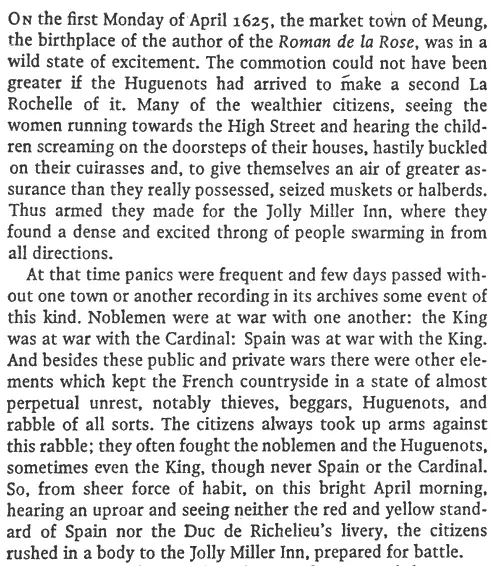
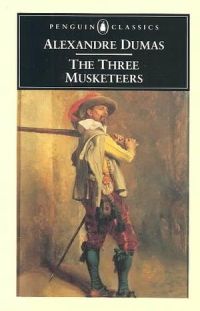
Get the Archive.org Sudley translation of The Three Musketeers
Includes an introduction by the translator. Out of print. You may be able to find a second-hand copy using the links below.
Available as a paperback (ISBN 9780140440256, 720 pages).
Who was Jacques Le Clercq?
Jacques Georges Clemenceau Le Clercq was a professor of French literature and Romances languages. An American citizen, he was born in what is now the Czech Republic and educated in England, France, and the US. He poetry, fiction, and articles, sometimes under the name Paul Tanaquil. He also translated Gargantua and Pantagruel by Francois Rabelais.
About the Le Clercq translation of The Three Musketeers
The Literary Omnivore: “Review of The Three Musketeers” by Clare McBride
McBride calls the translation “masterful” and says “there is a lot of wordplay that could have been lost in a poorer translation, but Jacques Le Clercq does a fantastic job… whenever a moment requires French, Le Clercq brings it out with a helpful translation integrated right in that flows beautifully.”
Extract from the Le Clercq translation of The Three Musketeers
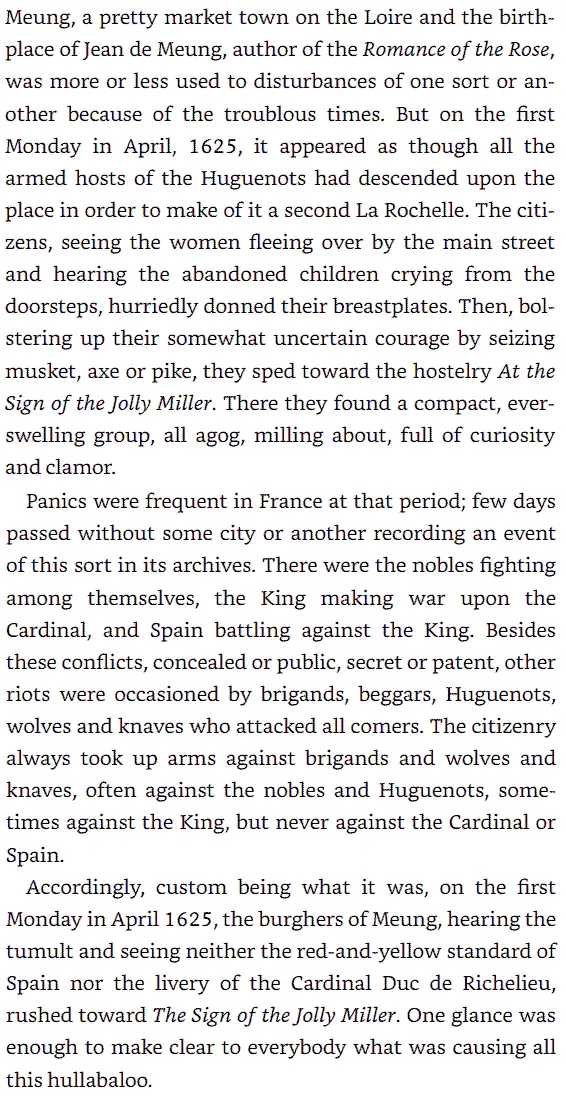
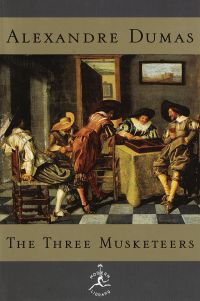
Get the Modern Library Classics Le Clerq translation of The Three Musketeers
Includes an introduction by the translator.
Available as a hardcover (ISBN 9780679603320, 624 pages).
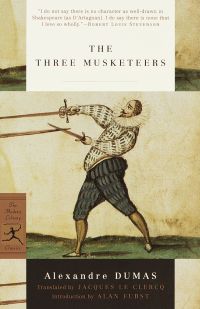
Get the Modern Library Classics Le Clerq translation of The Three Musketeers
Includes an introduction by Alan Furst.
Available as a paperback (ISBN 9780375756740, 640 pages).
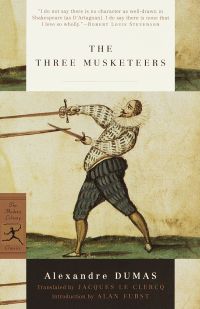
Get the Modern Library Classics Le Clerq translation of The Three Musketeers
Includes an introduction by Alan Furst.
Available as an ebook (ISBN 9780679641407).
Who was Isabel Ely Lord?
Isabel Ely Lord was an American librarian and writer. Mostly she wrote about cooking and home economics.
About the Lord translation of The Three Musketeers
Includes illustrations by Daniel Rasumsson.
At least some editions of the Lord translation, possibly all of them, are abridged.
Who is Lowell Bair?
He has translated Madame Bovary, The Phantom of the Opera, The Hunchback of Notre Dame, Cyrano de Bergerac, Candide, The Count of Monte Cristo, and The Red and the Black, among other works in French.
Extract from the Bair translation of The Three Musketeers
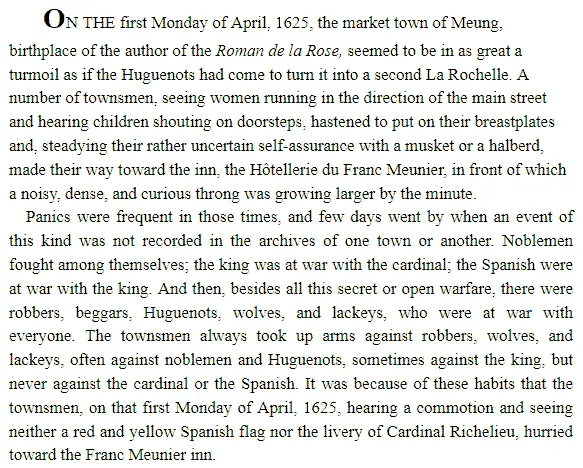
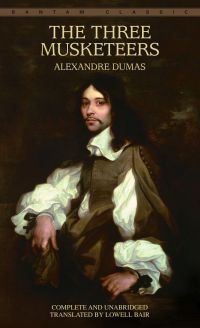
Get the Bantam Classics Bair translation of The Three Musketeers
Includes a few footnotes.
Available as a mass market paperback (ISBN 9780553213379, 656 pages).
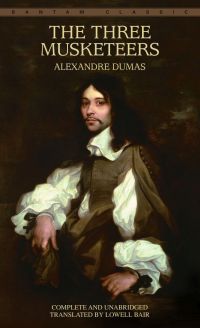
Get the Bantam Classics Bair translation of The Three Musketeers
Includes a few footnotes.
Available as an ebook (ISBN 9780553900712).
Who is David Coward?
David Coward is a writer, a translator, and an emeritus professor of modern French literature. He has produced or edited translations for Penguin and Oxford.
About the Barrow/Coward translation of The Three Musketeers
In the introduction, Oxford says, “The translation reproduced here was made by William Barrow for Bruce and Wyld (London, 1846).” Why? The Barrow translation is “the earliest and most pungent of the half-dozen or so English translations which have been made.”
Although the Barrow translation left out parts of Dumas’ text to satisfy Victorian sensibilities, Coward has inserted endnotes to explain what’s missing.
Extract from the Barrow/Coward translation of The Three Musketeers
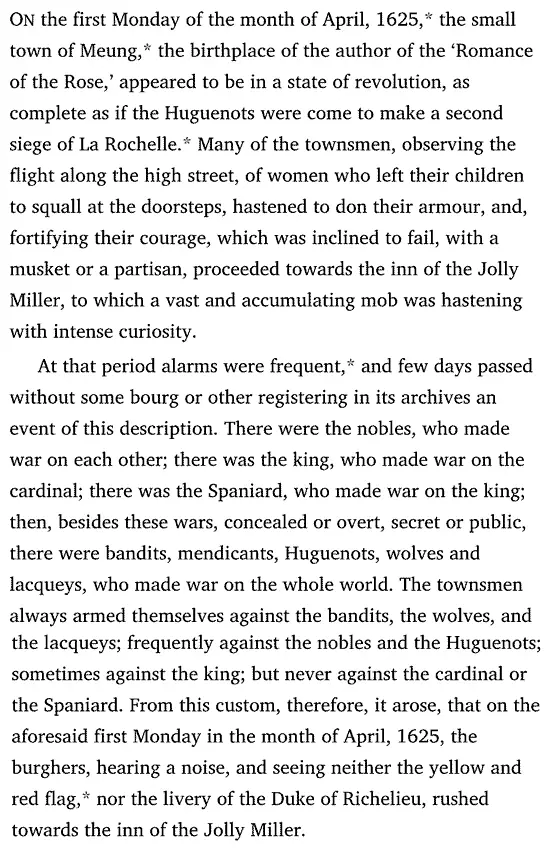
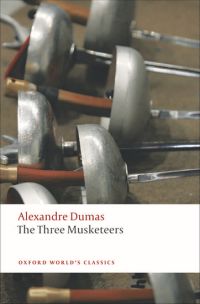
Get the Oxford Barrow/Coward translation of The Three Musketeers
Edited and with an introduction and endnotes by David Coward. Includes a select bibliography and a chronology of the author's life.
Available as a paperback (ISBN 9780199538461, 704 pages).
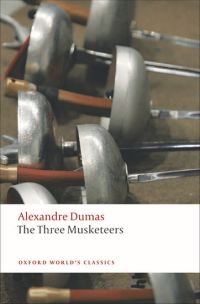
Get the Oxford Barrow/Coward translation of The Three Musketeers
Edited and with an introduction and endnotes by David Coward. Includes a select bibliography and a chronology of the author's life.
Available as an ebook (ISBN 9780192835758).
Who is Richard Pevear?
Richard Pevear is an American emeritus professor of comparative literature with experience translating from French, Italian, Spanish, and Greek. With his wife Larissa Volokhonsky, he was catapulted to translator fame when Oprah chose the couple’s translation of Anna Karenina for her book club. The couple have produced many other Russian translations together.
About the Pevear translation of The Three Musketeers
New York Times: “All for One” by Terrence Rafferty
“Richard Pevear’s brisk, agile new translation succeeds, I think, because it does justice to the pure nuttiness of Dumas’s writing: the nonindustrial, nonformulaic, downright peculiar qualities that make a work of popular fiction memorable.”
The Baltimore Sun: “Dumas’ classic: The solemnity left out and the sex put back in” by Tim Rutten
This review does a good job Dumas’ serialized novel in its literary and historical context. Rutten says Pevear’s translation is of “stunning quality” and “wonderfully vivid”. Pevear’s hard work “is every English-speaking reader’s good fortune. First of all, there’s the sheer pleasure of giving yourself over to the exuberant – one might almost say uninhibited – energy of Pevear’s rendering. Whether through calculation or inclination, it’s exactly the right tone to revive a great and vital story made rather solemn and sodden in previous English-language versions.”
The Guardian: “All for One” by Adam Thorpe
“This revivifying, unbowdlerised translation into (American) English by Richard Pevear makes me realise what I was, in fact, missing. The Three Musketeers is a steamy, disturbing book.” Beware spoilers in this review!
Slate: “Musketeers Without a Cause” by Michael Wood
Wood calls Pevear’s prose “pretty clunky”, but later concludes, “The new translation is very readable (as are its predecessors), though there are quite a few lapses into pure translationese, that language that no one ever speaks: ‘what horror,’ ‘he is relegating me to the infamous,’ and so on. But Pevear has got rid of all the coyness about sex that marks most of the earlier versions, and above all he preserves the swift movement and casual complexity that Dumas’ breezy method creates.” Beware spoilers in this review!
Literary Transgressions: “Rereadings: A Dumas First Chapter in Translation(s)” by Corey
Corey compared first chapters by Barrow, Robson, Sudley, and Pevear. “Remarkably, Mr. Pevear did the impossible: he was actually more literal than Mr. Barrow but more readable than Mr. Robson. It was the perfect mix! He updated some vocabulary, but never simplified like Lord Sudley, and his narrative proceeded in an entirely pleasing manner that was loyal to the Dumas text while also conforming to English grammatical constructs and the general adventurous tone of the story.”
Pevear’s introduction to his translation says: “Unfortunately, some of the more recent English versions, including those most widely available today, are textbook examples of bad translation practice, and give their readers an extremely distorted notion of Dumas’s writing. The translators seem to have made it a rule to look at the original and do otherwise, as though following Dumas carefully would infringe upon their own creativity.”
Pevear’s introduction contains a list of the meanings of the French terms that he has retained (forms of address, titles, topographical terms, oaths, and currency denominations). The translation also retains the author’s continuity errors, as these are not seen to distract from the novel.
Will Hobson’s introduction to his translation says the Pevear translation is “immaculate, resolving all the textual questions and triumphantly bringing the English text up to date. Apart from anything else, it reverses a bowdlerising tendency on the part of its Victorian translators to cast a veil over the musketeers’ amorous exploits. In this, and every other respect, it is wonderful.”
Extract from the Pevear translation of The Three Musketeers
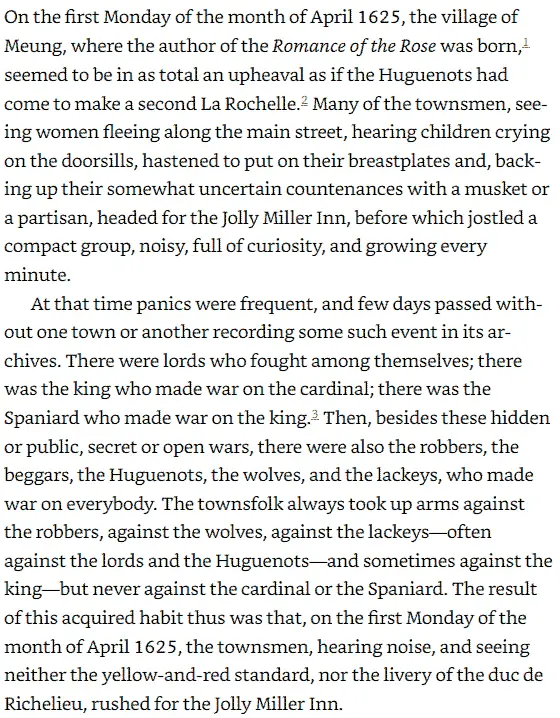
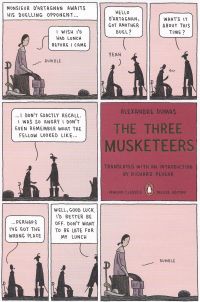
Get the Penguin Classics Pevear translation of The Three Musketeers
Includes an introduction by the translator. Cover illustration by Tom Gauld.
Available as a paperback (ISBN 9780143105008, 736 pages).
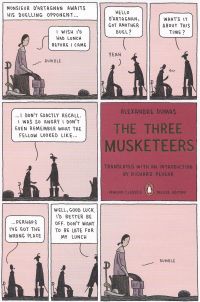
Get the Penguin Classics Pevear translation of The Three Musketeers
Includes an introduction by the translator. Cover illustration by Tom Gauld.
Available as an ebook (ISBN 9781101201527).

Get the Penguin Classics Pevear translation of The Three Musketeers
Includes an introduction by the translator.
Available as a paperback (ISBN 9780141442341, 736 pages).
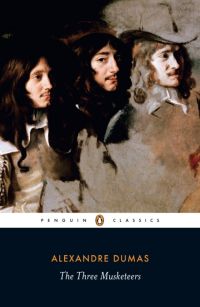
Get the Penguin Pevear translation of The Three Musketeers
Includes an introduction by the translator.
Available as an ebook (ISBN 9780141889955).
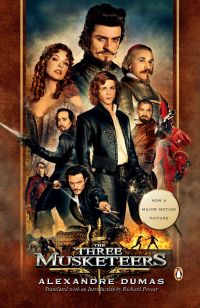
Get the Penguin Books Pevear translation of The Three Musketeers
Movie tie-in edition.
Available as a paperback (ISBN 9780143120841, 688 pages).
Who was Eleanor Hochman?
She was a writer, editor, and translator.
Extract from the Hochman translation of The Three Musketeers
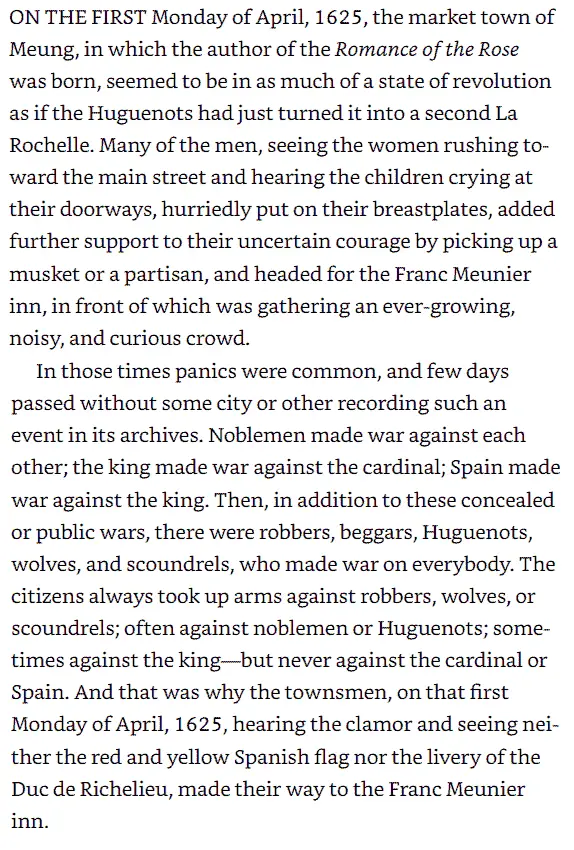
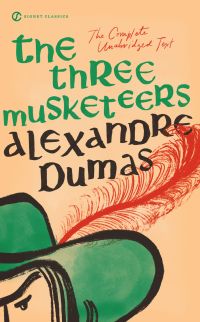
Get the Signet Hochman translation of The Three Musketeers
Includes an introduction by Thomas Flanagan and an afterword by Marcelle Clements.
Available as a paperback (ISBN 9780451530035, 672 pages).
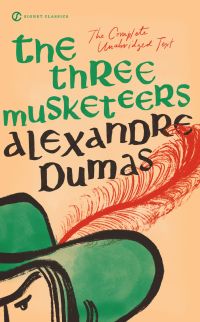
Get the Signet Hochman translation of The Three Musketeers
Includes an introduction by Thomas Flanagan and an afterword by Marcelle Clements.
Available as an ebook (ISBN 9780698183438).
Who is Will Hobson?
He is a critic and writer and has done translations from French and German.
About the Hobson translation of The Three Musketeers
Historical Novel Society: “Review of The Three Musketeers”
“I approached reading the new translation by Will Hobson with more than a little trepidation…. fortunately this book unlike so many classic translations does not disappoint. Let us be honest, the story is a classic for a reason, and Will Hobson has remained true to the original feel of Dumas’ novel. In doing so he allowed the characters to leap from the page and be tangible to the reader.”
Hobson says he has “translated the texts’ stream of oaths and irreverent expostulations rather than leave them in French”.
Extract from the Hobson translation of The Three Musketeers
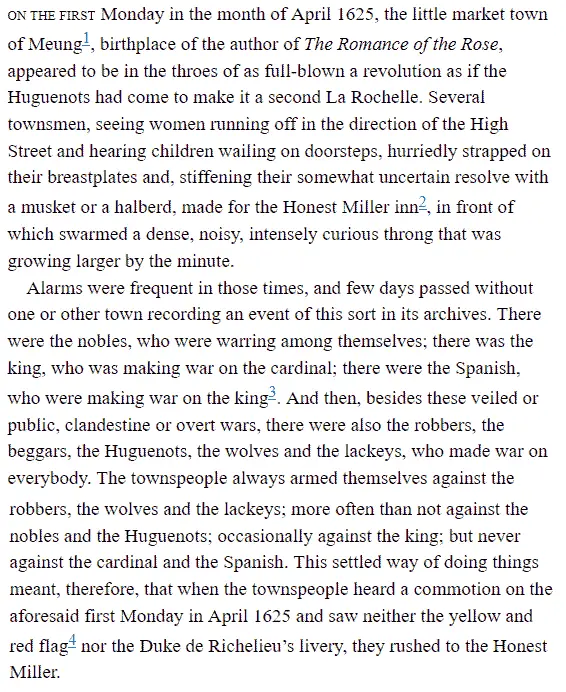

Get the BBC Books Hobson translation of The Three Musketeers
TV tie-in edition. Includes an introduction by the translator.
Available as a paperback (ISBN 9781849907491, 752 pages).

Get the BBC Digital Hobson translation of The Three Musketeers
TV tie-in edition. Includes an introduction by the translator.
Available as an ebook (ISBN 9781448142132).
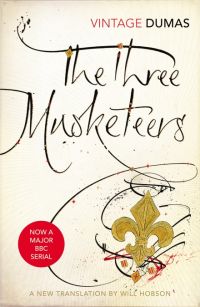
Get the Vintage Classics Hobson translation of The Three Musketeers
Includes an introduction by the translator.
Available as a paperback (ISBN 9780099583165, 752 pages).
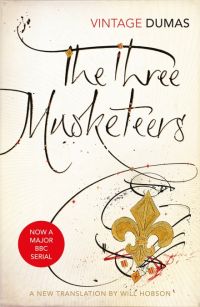
Get the Vintage Digital Hobson translation of The Three Musketeers
Includes an introduction by the translator.
Available as an ebook (ISBN 9781448181155).
Who is Lawrence Ellsworth?
Lawrence Ellswoth is the pen name of Lawrence Schick, an author, editor, and translator. He has worked on role-playing games, live-action role-playing games, multiplayer online role-playing games, and mobile games. He also loves swashbuckler fiction, and learned French so as to be able to read Dumas’ novels.
His website is https://swashbucklingadventure.net/
About the Ellsworth translation of The Three Musketeers
From Ellsworth’s introduction: “[M]ost published editions of the novel that you’ll find in bookstores and libraries still use translations that were prepared in the 1840s or 1850s, respectable but creaky adaptations endlessly recycled and reprinted, versions that simply don’t properly convey the energy and tone of Dumas’s original work…. By the standards of the mid-nineteenth century the novel took a rather frank approach to sexuality; those scenes, which were mostly or wholly elided from the Victorian translations, have been restored in this version. Not least important, I’ve also kept in all the jokes…. [S]ometimes your sacred duty to the reader requires you to make a terrible, terrible pun.”
Ellsworth is translating “The Musketeers Cycle” (approximately 1.5 million words) in nine parts. “[T]hese are deluxe editions including all lost and misplaced material, plus biographies of historical characters, explanatory notes on the text, and reproductions of period illustrations and engravings.”
- The Three Musketeers
- The Red Sphinx (the “lost sequel”, an unfinished manuscript titled “Le Comte de Moret”)
- Twenty Years After (first part of Twenty Years After)
- Blood Royal (second part of Twenty Years After)
- Between Two Kings (first part of Le Vicomte de Bragelonne)
- Court of Daggers (second part of Le Vicomte de Bragelonne)
- Devil’s Dance (third part of Le Vicomte de Bragelonne)
- (forthcoming:) Shadow of the Bastille (fourth part of Le Vicomte de Bragelonne)
- (forthcoming:) The Man in the Iron Mask (fifth part of Le Vicomte de Bragelonne)
Brooklyn Rail: “Down Away from the Sun You’ll Burrow” Lawrence Ellsworth in conversation with Andrew Ervin
Why does he like Dumas so much? “I was teaching myself French and rereading Dumas, and began to realize that his writing wasn’t creaky and old-fashioned, but his Victorian English translations were. Reading Dumas in the original French was a revelation: dynamic prose, crackling dialogue, vivid scenes, plus he was funny as hell. Most of the English translations of his work paled in comparison.”
The Wall Street Journal: “Alexandre Dumas’s Brotherly Love” by Tobias Grey
“A rip-snorting new translation of ‘The Three Musketeers’ by the American Lawrence Ellsworth captures all the excitement and flair of Dumas’s great historical adventure…. Mr. Ellsworth does a wonderful job of communicating the energy, humor and warmth of Dumas’s work [unlike] the translations of the 1840s and 1850s…. Mr. Ellsworth’s snappier approach, which included putting back all the racier scenes elided from the Victorian translations, suits Dumas much better.”
Open Letters Review: “Review of The Three Musketeers” by Zach Rabiroff
“Ellsworth was responsible for last year’s rip-roaring translation of The Red Sphinx, a “lost” Musketeers adventure, where he proved himself remarkably adept at capturing the flavor and verve of Dumas’s prose. Now, his mettle having been tested and his translator’s stripes earned, he has taken on the most iconic and familiar of the old crowd-pleaser’s novels, here presented in its full, unexpurgated 800-page glory…. [T]he test of a translator is his capacity to capture this characteristic interplay of the heroic and the ribald; the sincere and the ironic; the vanished past and the approaching present. And at this task Ellsworth succeeds, giving us a Three Musketeers with more clarity, energy, and simplicity than any previous English edition.”
Lithub: “Reuniting Two Halves of a Long-Lost Alexandre Dumas Novel” by Lawrence Ellsworth
“I’d been a fan of Alexandre Dumas’s Musketeers novels since Richard Lester’s 1973 film of The Three Musketeers had sent me looking for the source material, but it wasn’t until around 2000, when I was sketching out a novel set in the same period, that I really started digging into The Three Musketeers (1844) and its sequels. Dissatisfied with the available English translations, I turned to the original French versions and was delighted with what I found—Dumas was a strikingly modern writer for his time, with dynamic prose and crackling dialogue that was all too often stilted and stiffened when rendered into English by his 19th-century translators.”
Extract from the Ellsworth translation of The Three Musketeers
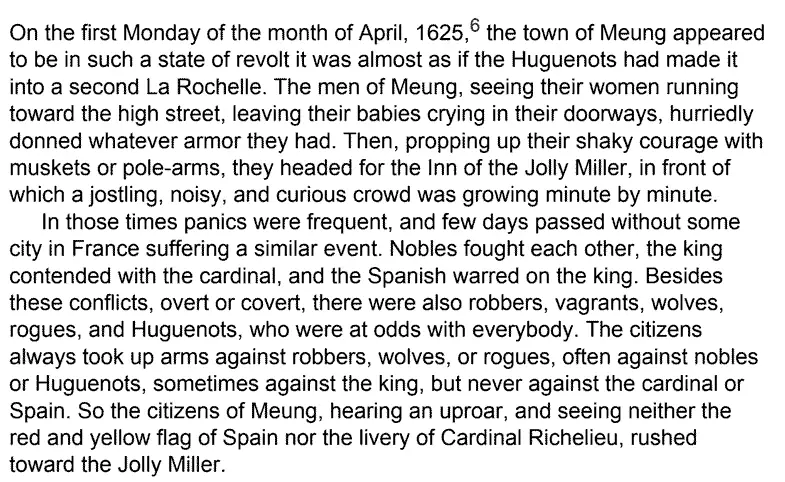
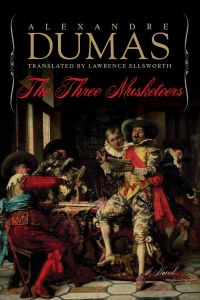
Get the Pegasus Books Ellsworth translation of The Three Musketeers
Includes an introduction by the translator.
Available as a paperback (ISBN 9781643130408, 816 pages).
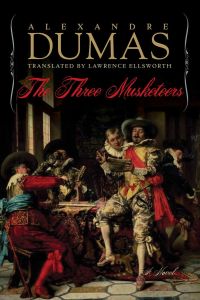
Get the Pegasus Books Ellsworth translation of The Three Musketeers
Includes an introduction by the translator.
Available as an ebook (ISBN 9781681776880).
Other Fiction by Dumas
So you’re planning to read The Three Musketeers? Well, hang on to your large, feathered hat because it’s the first book in a five-book trilogy! (Or a nine-book “cycle”, the way Ellsworth has divided up the novels.)
The D’Artagnan Romances
- The Three Musketeers
- Twenty Years After
- The Vicomte of Bragelonne AKA Ten Years Later
- Part 1: The Vicomte of Bragelonne
- Part 2: Louise de la Valliere
- Part 3: The Man in the Iron Mask
Some other popular titles by Dumas are:
- The Count of Monte Cristo
- The Black Tulip
- La Reine Margot
- The Queen’s Necklace
- Joseph Balsamo
- The Forty-Five Guardsman
- The Two Dianas
- The Knight of Maison-Rouge
- Pauline
- The Corsican Brothers
- Georges
Guides for The Three Musketeers
What’s the best The Three Musketeers translation?
If you want a free e-book, you can get the Robson translation from Gutenberg or Standard Ebooks.
If you want an un-bowdlerized version that is loyal to Dumas rather than Victorian sensibilities, you’ll need to choose a 21st-century translation. Of the four available, Pevear is the one with the strongest literary reputation; Ellsworth is the one most personally dedicated to the world of The Three Musketeers.
If you want a Victorian version, get the 1991 Oxford Barrow/Coward edition. Coward has added explanatory notes where the Barrow translation omitted information out of a sense of delicacy.
Whichever you choose, you’ll enjoy an adventure so appealing it’s never been out of print in over 150 years!

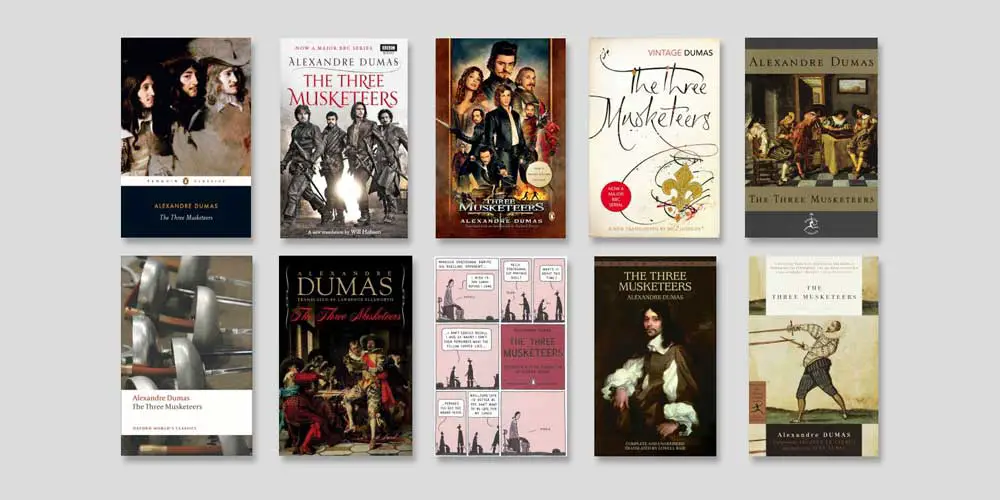
Do you have any recommendations for the best translation of 20 years after?
Here’s what I know so far about translations of Twenty Years After:
Henry Llewellyn Williams (1800)
William Barrow (1846)
Thomas Williams (1851)
William Robson (1856)
Anonymous? (1890s)
Alfred Richard Allinson (1904)
David Coward (2009) – probably an edited version of the Wiliam Barrow translation.
Lawrence Ellsworth (2019-2020)
Oxford’s version was said to be “the only version in print” when it was released in 2009. I don’t see any modern translations by Bair, Pevear, Hochman, or Hobson, so I think the only new modern translation is Ellsworth’s.
If you’re okay with an old translation, or you like free ebooks, there’s a free public domain ebook of an anonymous early translation published by Estes and Lauriat (late 1800s):
https://standardebooks.org/ebooks/alexandre-dumas/twenty-years-after/estes-and-lauriat
If I were a conspiracy theorist, I would conclude that in order to translate Twenty Years After, your name has to have at least one double L in it somewhere. Bonus points for the letter W, mega bonus points for two double Ls or if part of your name is William. XD
Thank you for this interesting article. Someone I know, who has read the French version, had told me about some of the descriptions and scenes from the three musketeers and it sounded like a really good story and I wanted to read it myself. So, stupidly now I realise, I bought the first one that came up – the Barrow translation and read half of it only to find that the wonderful descriptions I been expecting to find and some scenes weren’t there! I lost interest son after I must admit. After reading this article I realise why and am now going to get either the Pevears or the Ellsworth one so that I can appreciate it properly!
Thanks, Helen! I’m so glad you found the information useful. = )
This was super useful, many thanks.
Awesome article! Bonus points for showing what each translator did to same part of the book. Some of them are unreadable!
I wish I knew French so I could read the original. Unfortunately I don’t and, therefore, can’t say how close a translation is from the original work. The best I can do is say how pleasant and “readable” the ones I tried are. I haven’t read Richard Pevear’s yet, but I read Lawrence Ellsworth’s (up to Between Two Kings) and I thought it was great.
Unfortunately Lawrence Ellswort has not finished publishing the last book of the series, so I’ll give Richard Pevear a try. Assuming, of course, he translated the whole thing too
Thanks for the positive feedback! It sounds like you’ve run into the same problems Ellsworth did when he discovered Dumas: not knowing French, and not having many options for reading the later books in English.
The Oxford editions of Twenty Years After and Le Vicompte de Bragelonne say these novels are generally reproductions of classic translations from the 1850s.
As far as I know, Pevear has only done The Three Musketeers, none of the sequels. I don’t think there are modern translations of the whole series yet, so we’re stuck with the old ones for now. You can find digital copies for free online or get the edited/annotated Oxford ones, which at least try to mitigate the flaws of the old translations.